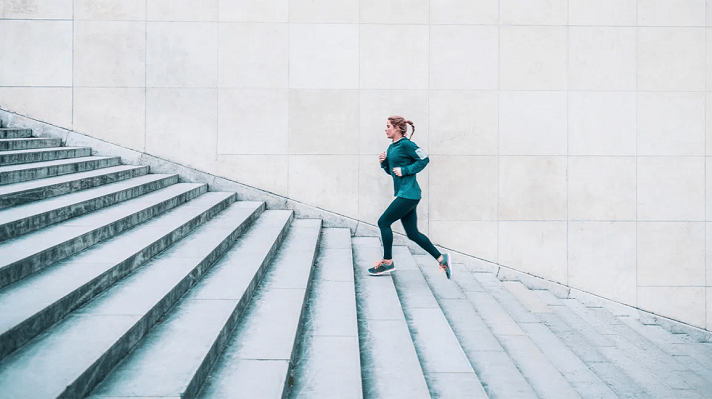Major evidence review supports an “exercise prescription” for most adults to boost mental health and well-being
 When you head to your weekly yoga class or lift weights at the gym, you’re doing something good for your physical health: getting more fit today, and so protecting your body into the future.
When you head to your weekly yoga class or lift weights at the gym, you’re doing something good for your physical health: getting more fit today, and so protecting your body into the future.
What you may not always think about, though, is that you’re also protecting yourself from anxiety and depression—about as much as you would be if you were going to therapy or taking medication. At least that’s the conclusion of a very large new study that synthesizes decades of research on exercise and mental health.
The study doesn’t just provide this key insight—in fact, the researchers were also able to identify what kind of exercise and how much of it is best for mental health.
How body supports mind:
Researchers analyzed the results from more than 1,000 randomized controlled trials—one of the strongest types of studies. These experiments, with over 128,000 participants, had compared exercise to standard treatments like simply learning about fitness or getting help setting goals.
The participants engaged in a variety of physical activities, from yoga and tai chi to aerobics and dance to strength training. Some people had various health conditions, while others were suffering from depression, anxiety, or post-traumatic stress disorder. In the original studies, they or their clinicians rated their symptoms of depression, anxiety, and distress before and after the exercise program or treatment.
The results suggested that exercising helped people reduce their depression, anxiety, and distress even more than usual treatments.
“Physical activity can be an effective treatment for mental health problems,” says Ben Singh, lead author and research fellow at the University of South Australia. He thinks it works in several ways: by releasing endorphins and boosting our mood, improving sleep, reducing stress, supporting self-esteem and confidence, and making us feel accomplished and purposeful.
The findings suggest that exercise is particularly helpful in certain situations. While the type of exercise didn’t matter, people got more mental health benefits out of higher-intensity exercise. If you’re doing something that makes you breathe hard, in other words, that’s a good sign.
And it seems like you don’t have to exercise obsessively to see benefits. The sweet spot was four to five sessions per week—not every day, but most days. Workouts don’t have to be long; there was no difference between 30-minute workouts and hourlong ones. The researchers suggest that this moderate amount of exercise may feel more manageable, so it doesn’t become a burden in people’s lives.
The benefits of exercise might not be immediate, says Singh, but they should show up within weeks or months. Beyond that, the longer people engaged in exercise, the less additionally beneficial it became for their mental health. This may be because they were sticking to the program less, due to waning motivation or, perhaps, injury. It could also be because the exercise itself began to feel less novel and more repetitive.
Depending on what you’re dealing with in your life, you may be a better candidate to benefit from exercise. In this study, the groups who saw the biggest reductions in depression were healthy people, as well as those with depression diagnoses, kidney disease, HIV, or chronic obstructive pulmonary disease. The groups who saw the biggest reductions in anxiety were those with anxiety disorders or cancer. It’s possible, the researchers suggest, that these people may have had more room for improvement in terms of their mental health.
An exercise prescription:
If exercise is so helpful for feelings of depression and anxiety, why aren’t doctors prescribing it more? In the United States, the researchers explain, exercise, sleep, and diet changes are considered “complementary alternative treatments” if therapy and drugs don’t work. But in other countries, such as Australia, these lifestyle factors are addressed earlier on.
“Physical activity is a safe and effective way to improve mental health, and it is a treatment that should be considered alongside other treatments, such as therapy and medication,” says Singh.
One reason why it may not be considered is the difficulty of monitoring exercise and getting people to follow recommendations. Depression, in particular, can reduce our motivation and energy. If that’s the case, Singh suggests a few ways to get yourself motivated to exercise:
- Start small. If you’re not used to exercising, start with small goals, such as walking for 10 minutes a day or doing some light stretching. As you get more comfortable with exercise, you can gradually increase the intensity or duration of your workouts.
- Find an activity you enjoy. If you don’t enjoy the type of exercise you’re doing, you’re less likely to stick with it. Try different activities until you find one that you really enjoy. Some people enjoy running, swimming, biking, yoga, dancing, or hiking. You may also want to try group exercise classes or working out with a friend.
- Make exercise a habit. The more you exercise, the easier it becomes. Try to make exercise a regular part of your routine, such as going for a walk after work or working out first thing in the morning.
- Set realistic goals. Don’t try to do too much too soon. Start with small goals and gradually increase the intensity or duration of your workouts as you get more fit.
- Reward yourself. When you reach a goal, reward yourself with something you enjoy. This will help you stay motivated and on track.
- Don’t give up. There will be days when you don’t feel like exercising. But it’s important to push through these days and keep exercising. The more you exercise, the better you’ll feel.
For people dealing with depression, in particular, Singh suggests going easy on yourself and getting help when needed—the accountability of an exercise buddy, or advice from doctors or therapists to help you stick to it. “Exercise can be a helpful part of treatment, but it’s not a cure,” he says. It’s “not a replacement for current treatments such as medications and counseling.”
That said, it’s something you can do that is accessible, with few side effects, and with many benefits besides the mental health ones. Why not give it a try?
 – Kira M. Newman is the managing editor of Greater Good and the co-editor of The Gratitude Project. Based at UC-Berkeley, Greater Good highlights ground breaking scientific research into the roots of compassion and altruism. Copyright Greater Good.
– Kira M. Newman is the managing editor of Greater Good and the co-editor of The Gratitude Project. Based at UC-Berkeley, Greater Good highlights ground breaking scientific research into the roots of compassion and altruism. Copyright Greater Good.
The Study:
Effectiveness of physical activity interventions for improving depression, anxiety and distress: an overview of systematic reviews (British Journal of Sports Medicine). From the abstract:
- Objective: To synthesise the evidence on the effects of physical activity on symptoms of depression, anxiety and psychological distress in adult populations.
- Results: … The largest benefits were seen in people with depression, HIV and kidney disease, in pregnant and postpartum women, and in healthy individuals. Higher intensity physical activity was associated with greater improvements in symptoms. Effectiveness of physical activity interventions diminished with longer duration interventions.
- Conclusion and relevance: Physical activity is highly beneficial for improving symptoms of depression, anxiety and distress across a wide range of adult populations, including the general population, people with diagnosed mental health disorders and people with chronic disease. Physical activity should be a mainstay approach in the management of depression, anxiety and psychological distress.


